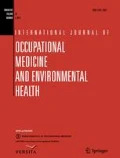Abstract
Objectives
This current study investigates the effect of lean management system on work attitudes of workers of two manufacturing companies. “Lean management” is a concept of work processes and human relations that determines company’s productivity and profitability. Workers of two enterprises, the first one with lean production and the second one with old mass production, were compared for their readiness for change and job satisfaction (both emotional and cognitive aspect).
Materials and Methods
The sample of 102 employees completed a battery of instruments such as: the Job Description Inventory by Neuberger and Allerbeck, the Job Affect Scale by Burke et al. and the Change-Readiness Scale by Kriegel and Brandt. Results: Individuals from the lean manufacturing company were characterized by higher level of readiness for change, positive affect at work, and cognitive job satisfaction.
Conclusions
In this approach the introduction of lean production positively affected company’s human resource attitudes.
Similar content being viewed by others
References
Sun S. The strategic role of lean production in SOE’s Development. Int J Business Manag 2011;6:160–168.
Applebaum E, Batt R. The new American workplace: Transforming work systems in the United States. Ithaca, NY: ILR Press; 1994.
Womack JP, Jones DT, Roos D. The machine that changed the world. New York: Macmillan; 1990.
Taira K. Compatibility of human resource management, industrial relations, and engineering under mass production and lean production: an exploration. Appl Psychol 1996;45:97–117.
Fucini J, Fucini S. Working for the Japanese: Inside Mazda’s American auto plant. New York: Free Press; 1990.
Parker M, Slaughter J. Choosing sides: Unions and team concept. Boston: South End Press; 1988.
Landsbergis PA, Cahill J, Schnall P. The impact of lean production and related new systems of work organization on worker health. J Occup Health Psychol 1999;4:108–130.
Adler PS, Cole RE. Designed for learning: A tale of two auto plants. Sloan Manag Rev 1993;34:85–94.
Mullarkey S, Jackson PR, Parker SK. Introducing JIT within product-based work-teams. Int J Operat Product Manag 1995;15:62–79.
Jackson PR, Mullarkey S. Lean production teams and health in garment manufacture. J Occup Health Psychol 2000;5:231–245.
Parker SK. Longitudinal effects of lean production on employees outcomes and mediating role of work characteristics. J Appl Psychol 2003;4:620–634.
Brief AP. Attitudes in and around organizations. Thousand Oaks, CA: Sage; 1998.
Neuberger O, Allerbeck M. Measurement and Analysis of Satisfaction with Work. Bern, Stuttgart, Wien: Rubber; 1978 [in German].
Kriegel R, Brandt D. Sacred cows make the best burgers. Developing change-ready people and organizations. New York: Warner Books; 1996.
Change management: the HR strategic imperative as a business partner. HR Magazine 2007;01 December [cited 2012 January 4]. Available from URL: http://goliath.ecnext.com/coms2/gi_0199-7310774/Change-management-theHR-strategic.html.
Chatman JA, Jehn KA. Organizational culture in the service sector: A between-industry comparison. Evanston: Northwestern University; 2001.
Chapman ML, Elhance AP, Wenum JD. Mitsubishi Motors in Illinois: Global strategies, local impacts. Westport, CT: Quorum Books; 1995.
Unchanged job satisfaction with “Lean”. NordKraft 2010;24 January [cited 2012 January 6]. Available from URL: http://nordkraft.biz/unchanged-job-satisfaction-with-lean.
Nordin N, Deros BM, Wahab DA. Relationship between organizational change and lean manufacturing implementation in Malaysian automotive industry. The 14th Asia Pacific Regional Meeting of International Foundation for Production Research; 2010 Dec 7–10, Melaka, Malaysia [cited 2012 January 5]. Available from URL: http://apiems.net/archive/apiems2010/pdf/LM/19.pdf.
Papadopoulou TC, Ozbayrak M. Leanness: experience from the journey to date. J Manufact Technol Manag 2005;16:784–807.
Hardin E. Job satisfaction and the desire for change. J Appl Psychol 1967;16:20–27.
Brief AP, Burke MJ, George JM, Robinson B, Webster J. Should negative affectivity remain an unmeasured variable in the study of job stress? Journal of Applied Psychology 1988;73:193–198.
Adler PS. The “learning bureaucracy”: New United Motor Manufacturing. In: Staw BM, Cummings LL, editors. Research in organizational behavior. Greenwich, CT: JAI Press; 1993. p. 111–194.
Beckhard R, Harris R. Organizational Transitions: Managing Complex Change. Reading, MA: Addison-Wesley; 1987.
Brofenbrenner M. An essay on negative screening. In: Shishido T, Sato I, Okita S, editors. Economic policy and development: new perspectives. London: Croom Helm; 1985. p. 188–198.
Author information
Authors and Affiliations
Corresponding author
About this article
Cite this article
Lipińska-Grobelny, A., Papieska, E. Readiness for change and job satisfaction in a case of lean management application — A comparative study. IJOMEH 25, 418–425 (2012). https://doi.org/10.2478/S13382-012-0044-4
Received:
Accepted:
Published:
Issue Date:
DOI: https://doi.org/10.2478/S13382-012-0044-4




